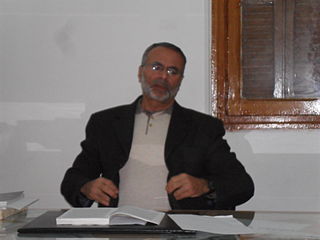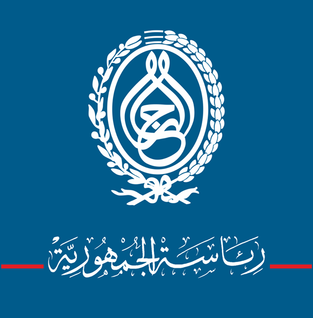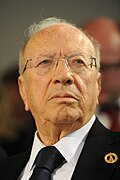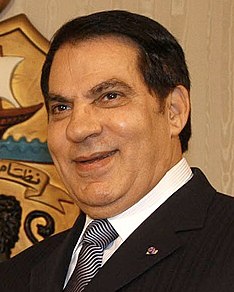
Mohamed Ghannouchi is a Tunisian politician who was Prime Minister of Tunisia from 1999 to 2011. Regarded as a technocrat, Ghannouchi was a long-standing figure in the Tunisian government under President Zine El Abidine Ben Ali. He also served as the Acting President of Tunisia from 14 January 2011 to 15 January 2011, holding the powers and duties of the office nominally for the absent President Zine El Abidine Ben Ali, who had fled the country due to the 2011 revolution. On 15 January 2011 the presidency was declared vacant by the Constitutional Court and Ben Ali's term was officially terminated, leading to Speaker of Parliament Fouad Mebazaa taking office as Interim President. Ghannouchi stayed on as Prime Minister for six more weeks after Ben Ali's overthrow before himself resigning.

The Constitution of Tunisia is the supreme law of the Tunisian Republic. The constitution is the framework for the organization of the Tunisian government and for the relationship of the federal government with the governorates, citizens, and all people within Tunisia. Tunisia's first modern constitution was the Fundamental Pact of 1857. This was followed by the Constitution of 1861, which was not replaced until after the departure of French administrators in 1956, by the constitution of 1959. It was adopted on 1 June 1959 and amended in 1999 and 2002, after the Tunisian constitutional referendum of 2002.

A presidential election was held in Tunisia on 23 November 2014, a month after the parliamentary election. It was the first free and fair presidential election since the country gained independence in 1956, as well as the first regular presidential election after the Tunisian Revolution of 2011 and the adoption of a new Constitution in January 2014.

Farhat Rajhi is a Tunisian politician. He was interim minister of interior affairs between January 27 and March 28, 2011, in the government of Prime Minister Mohamed Ghannouchi.

Mohamed Beji Caid Essebsi was a Tunisian politician who was the President of Tunisia from 31 December 2014 until his death on 25 July 2019. Previously, he served as Minister of Foreign Affairs from 1981 to 1986 and as Prime Minister from February 2011 to December 2011.
During the Tunisian Revolution, Zine El Abidine Ben Ali who acted as president of Tunisia for 23 years fled. Mohamed Ghannouchi formed a new government. Fouad Mebazaa took office in January 2011 as interim president. A new government was formed on 17 January 2011. On 27 January 2011 there were changes in the government.

Abderraouf Ayadi is a Tunisian human rights activist, politician and lawyer.

The first cabinet of Tunisian Head of Government Hamadi Jebali was presented on 20 December 2011. Jebali has been appointed by interim President Moncef Marzouki, who had been elected by the National Constituent Assembly, a body constituted to draft a new constitution after the Tunisian Revolution and the fall of former President Zine El Abidine Ben Ali in Spring 2011. It took office on 24 December 2011. The three parties in the "Troika" coalition are the Islamist Ennahda Movement, the centre-left secularist Congress for the Republic (CPR), and the social democratic Democratic Forum for Labour and Liberties (Ettakatol).

Noureddine Bhiri is a Tunisian politician. He serves as the Minister of Justice under Prime Minister Hamadi Jebali.

Nidaa Tounes is a big tent secularist political party in Tunisia. After being founded in 2012, the party won a plurality of seats in the October 2014 parliamentary election. The party's founding leader Beji Caid Essebsi was elected President of Tunisia in the 2014 presidential election.

Legislative elections were held in Tunisia on 26 October 2014. Campaigning started on 4 October 2014. They were the first free regular legislative elections since independence in 1956, and the first elections held following the adoption of the new constitution in January 2014, which created a 217-seat Assembly of the Representatives of the People. According to preliminary results, Nidaa Tounes gained a plurality of votes, winning 85 seats in the 217-seat parliament, beating the Ennahda Movement and many smaller parties.

Othman Battikh is a Tunisian Islamic scholar, Grand Mufti of Tunisia, and former member of the Tunisian government.

Mohamed Ennaceur is a Tunisian politician who became interim President of Tunisia on 25 July 2019, upon the death of President Beji Caid Essebsi. Since 2014 he has been the President of the Assembly of the Representatives of the People and leader of the governing Nidaa Tounes party. Previously he served as Minister of Social Affairs in the 1970s and 1980s under President Habib Bourguiba, and again in 2011 in the transitional Ghannouchi and Essebsi governments.
Events in the year 2017 in Tunisia.
The following lists events in the year 2018 in Tunisia.

Presidential elections are scheduled to take place in Tunisia on 15 September 2019. If no candidate receives a majority of the vote, a runoff election will be held on 22 September. Prior to the death of incumbent president Beji Caid Essebsi on 25 July, the elections had been planned for 17 and 24 November. However, as a result of Essebsi's death, the elections were brought forward in order to ensure that a new president would take office within 90 days, as required by the constitution.
Events in the year 2019 in Tunisia.
This page is based on this
Wikipedia article Text is available under the
CC BY-SA 4.0 license; additional terms may apply.
Images, videos and audio are available under their respective licenses.




























